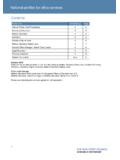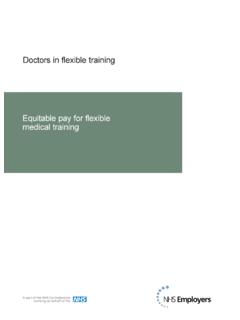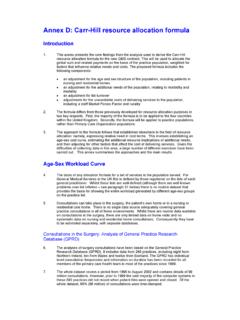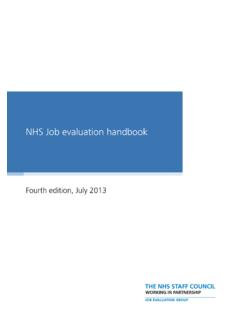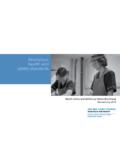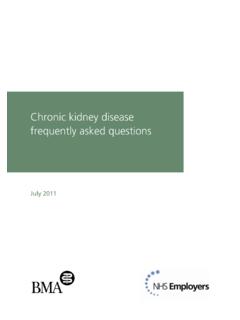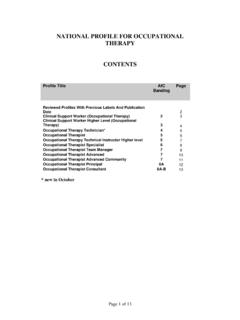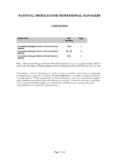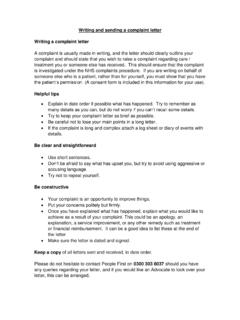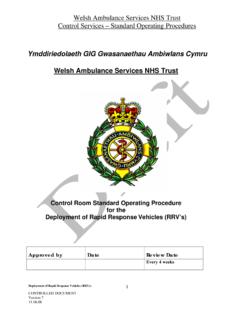Transcription of THE NHS STAFF COUNCIL - Home - NHS Employers
1 1 THE NHS STAFF COUNCIL WORKING IN PARTNERSHIP Implementation of the new Band 6 Paramedic Profile in ambulance Trusts in England Parties to this agreement are: NHS Employers The 10 English ambulance Trusts and Isle of Wight NHS Trust NHS Trade Unions Department of Health NHS Improvement NHS England Section 1 This section gives details for the process of managing the matching and assimilation of current Paramedics to the new band 6 job profile. This agreement should be read in conjunction with the advice from the Job Evaluation Group (JEG) and the published FAQs. Both documents are available on NHS Employers website. It is important to note that although the band 6 profile is available for use across all four UK countries, this agreement relates to implementation in the ten ambulance trusts in England only.
2 1. Mechanism This is re-banding: the Agenda for Change rules on pay on promotion do not apply. If the job of a paramedic in pay band 5 matches to the new band 6 profile the following applies: paramedics on pay spine points in pay band 5 that overlap with corresponding pay spine points in band 6 will, on assimilation, move across to the same pay spine point in band 6. Thereafter they will progress up the incremental points in band 6 in line with their personal incremental date. paramedics in pay band 5 on pay points below the first overlapping pay spine point will move to the lowest pay point in pay band 6 and their incremental date will be the date of assimilation. 2. Effective date The effective date of pay changes resulting from matching a band 5 paramedic job to the new band 6 profile will be 31 December 2016.
3 If a decision on a job match is made after this date the change in pay will be effective from 31 December 2016 and arrears of pay will be payable. 3. Newly Qualified Paramedic Employers and trades unions recognise the importance, and will work in partnership on the development and support of training programmes for new entrants to the profession. This work will include: o scope of practice; o scope of deployment; 2 o job description(s); o person specification(s); o arrangements for clinical supervision: these new entrant programmes will ordinarily be for a period of 24 months and conditional upon individuals demonstrating they have the requisite knowledge, skills/competencies for their role and that they have demonstrated the required level of performance and delivery during the programme period, as determined locally: JEG will be asked to provide advice and guidance and to consider the need for a new profile for new entrant practitioners at pay band 5: a "consolidation of learning" period will apply to all newly qualified paramedics who were recruited into one of the ten ambulance trusts in England on or after 1 September 2016.
4 These STAFF will be expected to remain in pay band 5 normally no longer than a period of two years, consolidating and acquiring experience and competence: as a matter of urgency, Employers will provide numbers of STAFF who have joined ambulance trusts since 1 September 2016 and age, ethnicity and other data on their characteristics in order to facilitate discussion of application of the NQP programme to STAFF joining between that date and 31 December. 4. Existing linked banding agreements Leads and allowances and other payments which have been agreed in local collective agreements, which relate to job weight as valued in the job evaluation scheme, will end on 1 April 2017 (the effective date of assimilation) for paramedics in pay band 5 whose job is matched to the new band 6 profile.
5 Leads, allowances and other payments agreed by local agreement relating to meal breaks, which are not provided for in the NHS Terms and Conditions of Service Handbook and which do not relate to job weight, will not be affected by this agreement. There will be transitional arrangements which will ensure that existing STAFF do not have a reduction in earnings. Existing local collective agreements for use of band 6 ( linked bandings , run throughs ) will end on 1 April 2017. 5. Funding NHS England and NHS Improvement will work together to deliver the terms of the agreement between NHS Employers and the ambulance trade unions, including the job matching process to the new band 6 profile, the new band 5 NQP role and the commitment to develop and implement consistent job descriptions to deliver the Urgent and Emergency Care Review (UECR).
6 Funding will be agreed by the Department of Health, NHS England and NHS Improvement to support delivery of the agreement with funding in future years linked to agreements between ambulance Trusts and commissioners on delivery of the UECR. 3 Section 2 6. Urgent and Emergency Care Review (UECR) The parties acknowledge the ambitions of the UECR and will work together to support the consistent national application of the new models of care and ways of working required by the UECR. The UECR offers opportunities to develop the practice of paramedics, and the parties will work together to support this initiative. Following the local job matching process these principles will be implemented.
7 7. Principles The parties agree therefore to: work collaboratively to adopt the practice changes of the UECR for paramedic roles and develop future job descriptions to support greater consistency in the scope of paramedic practice: work in partnership to deliver consistency and clarity to the purpose, duties and responsibilities of the role of a paramedic across all ten ambulance trusts. This work will reflect the evolution of the role of the paramedic over the last ten years and the aspirations of the UECR: ensure that paramedic roles across England will be consistent by 2020, delivering on the objectives of the UECR, particularly in regard to delivery of the See and Treat and Hear and Treat pathways; by September 2017, determine the training needs for paramedics to help them meet the required competencies and develop a nationally consistent approach to describe appropriate roles and support for those paramedics who are unable to meet the competency requirements of the new band 6 paramedic job description(s).
8 By the end of June 2017, have determined the process for adoption of consistent new (UECR) paramedic job description(s) across ambulance trusts, including the content and resources needed for training and support programmes where role expansion is implied: by April 2017, develop a nationally consistent approach to the assessment of accredited previous practice as a paramedic, or other practitioner, for entry into the fast track programme to band 6: by April 2018, all established paramedics to have agreed a personal development plan describing their training and development needs, with the aim that by April 2019 all training requirements will have been planned an accepted, and this training will be completed by April 2020.
9 8 December 2016 4 Signed by: Miles Scott Improvement Director: NHS Improvement Paul Wallace Director of Employment Relations and Reward: NHS Employers Tim Sands Deputy Director, Pay Pensions and Employment Services: Department of Health Professor Keith Willett Medical Director for Acute Care, NHS England Ken Wenman Workforce Lead, the Association of ambulance Chief Executives and Chief Executive South Western ambulance Service NHS Foundation Trust Christina McAnea UNISON Head of Health Sharon Holder National Officer GMB Public Services Section Sarah Carpenter National Officer (Health)
